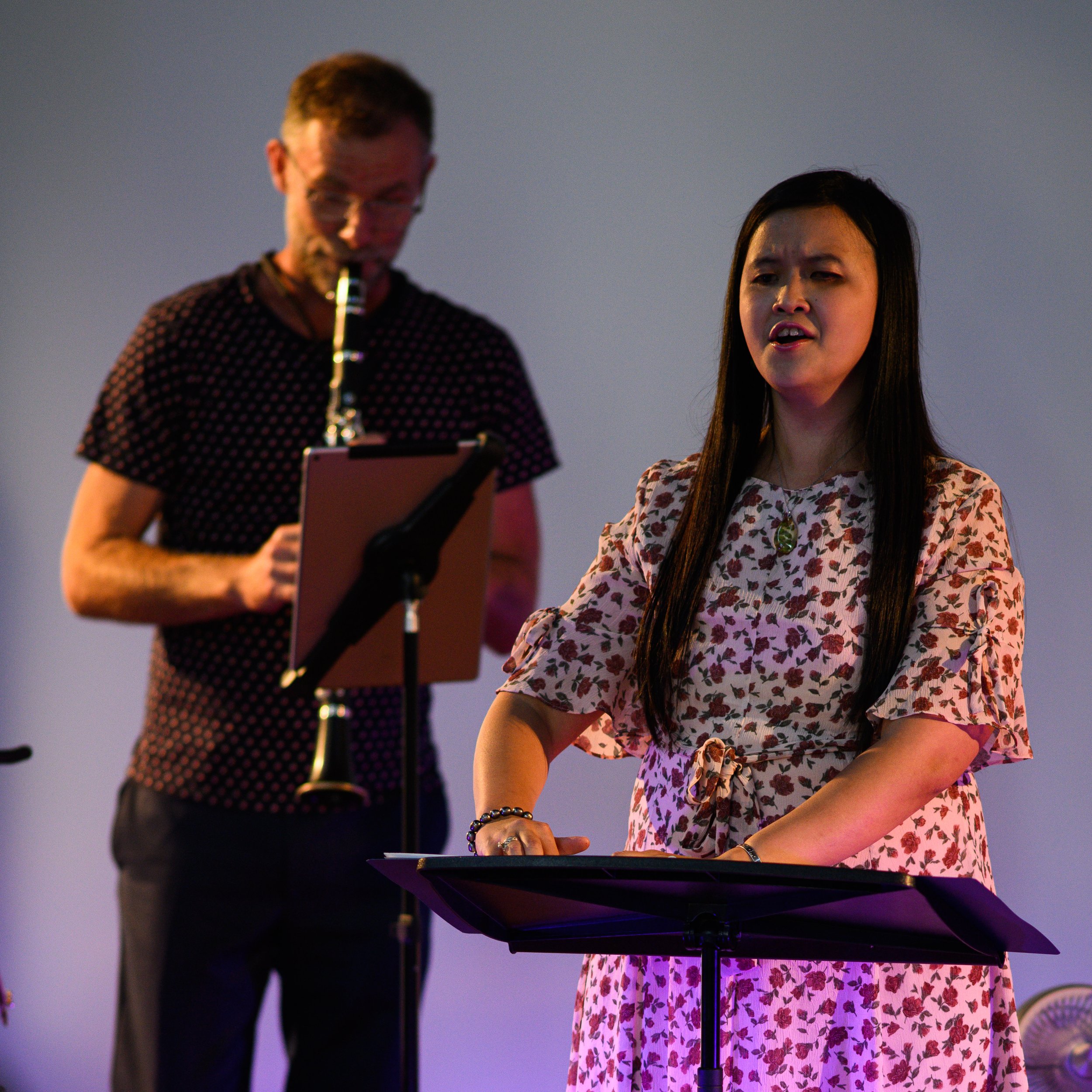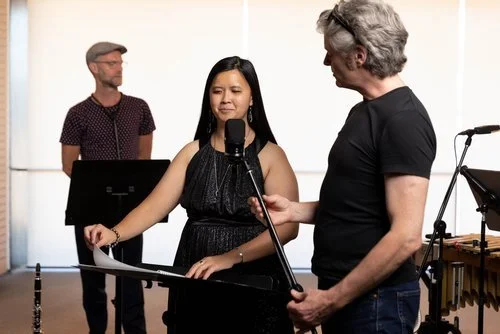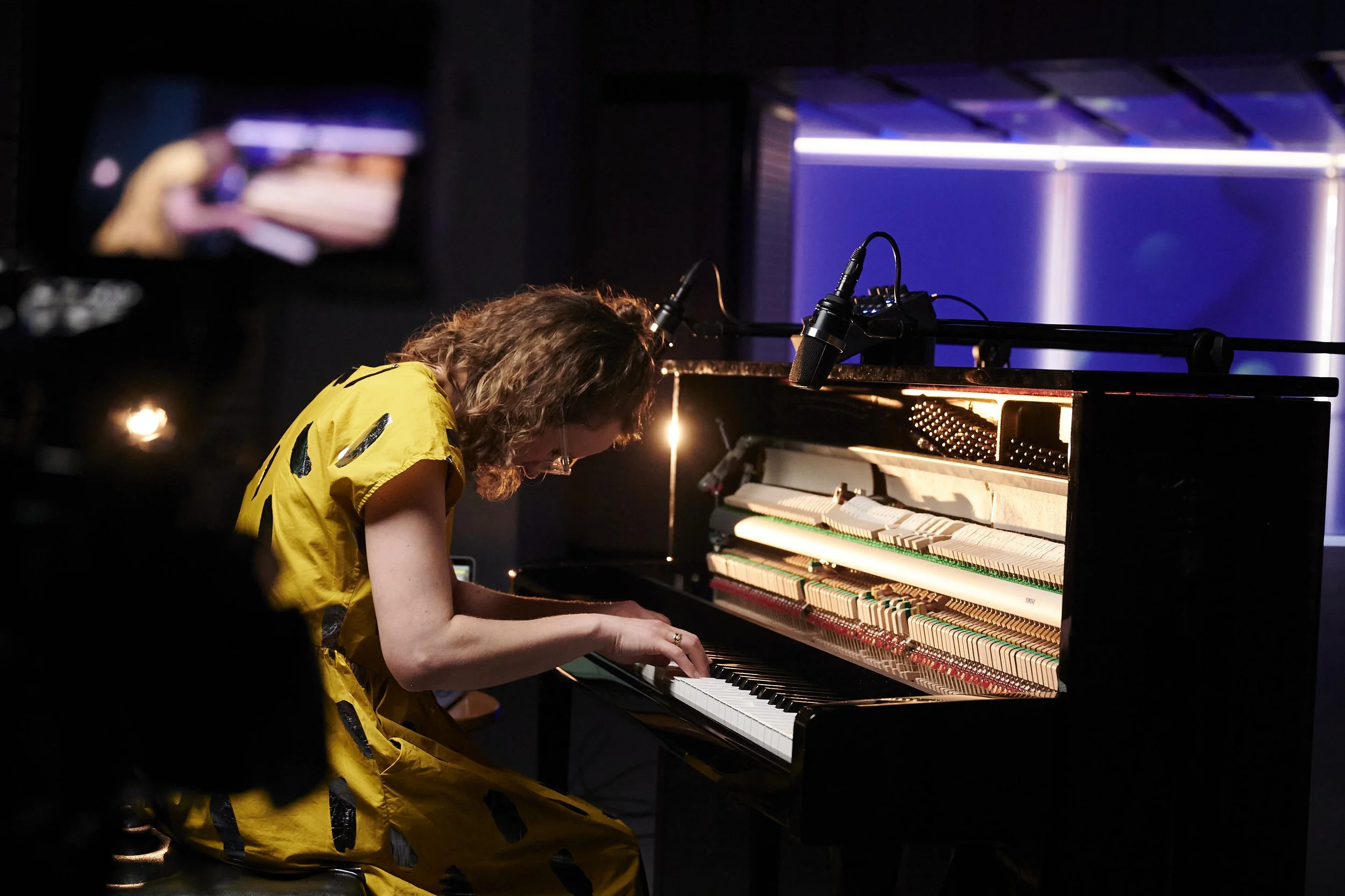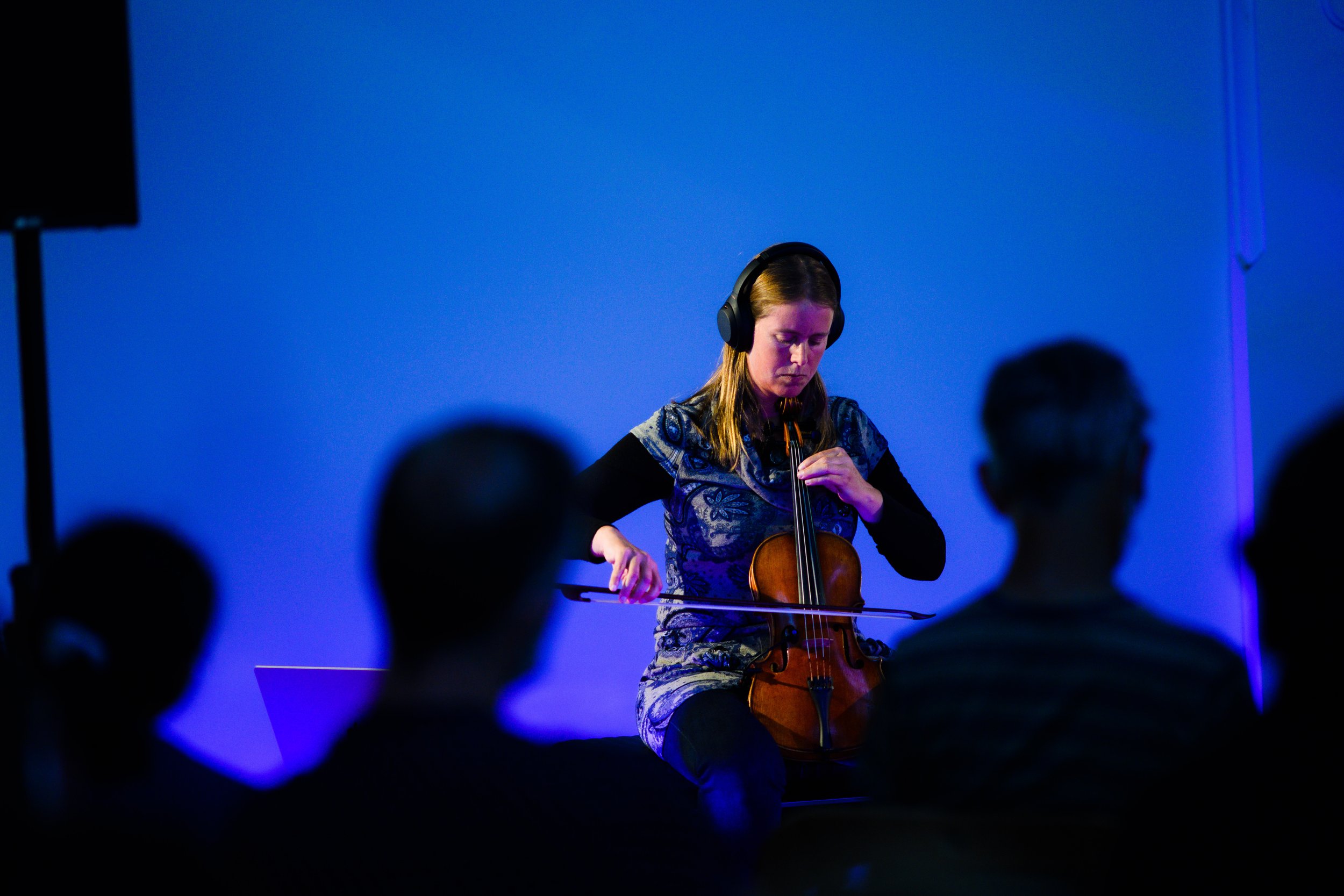Disability Inclusion & Access Plan
Created by Georgia Scott & Lamorna Nightingale with feedback from Accessible Arts & Ria Andriani
As part of our mission to provide "A Living Space for Living Music," Backstage Music presents an annual program celebrating the extraordinary talents of artists with disabilities. Our dedicated Inclusion and Access subcommittee is passionate about integrating inclusion into our arts practice, for instance, turning accessibility measures such as audio description into art, and finding ways of sharing it with a wider audience. See what we have accomplished to date with our previous shows TRACE and SHIFT. Following their success, in 2025 we are building on these ideas with UNBOUND.
The future of music is one where everyone belongs. Join us in celebrating the power of music to connect us all and shape a more inclusive arts landscape.
If you are considering coming to any of our shows and would like to discuss accessibility options at our venues, please reach out to us on info@backstagemusic.com.au
INCLUSION AND ACCESS SUB-COMMITTEE
Building on its strong commitment, Backstage Music is strategically developing an Inclusion and Access Sub-committee to further embed these values within its organisational framework. This dedicated group will play a crucial role in guiding the implementation of the Disability Inclusion Action Plan and offering specialised expertise on all matters related to inclusion and access. By fostering collaboration between artists, practitioners, audiences with disability, and Backstage Music representatives, the subcommittee will ensure that community feedback directly shapes accessibility initiatives. We will use this subcommittee to seek out creative solutions to address barriers to foster a safe and comfortable environment for all artists while ensuring our goals are financially feasible for a small organisation.
Ria Andriani performing alongside Jason Noble, Clarinetist.
Georgia Scott - Access Facilitator
-
The ongoing role of the Access Facilitator, held by Georgia Scott, is central to Backstage Music's commitment to accessibility. This involves providing continuous curatorial guidance to ensure programs are inherently inclusive, offering expert advice on best practices in disability access, and actively training staff while sharing crucial knowledge across the organisation. This role also entails direct, ongoing support for artists with disabilities, ensuring their individual access needs are met throughout every project, and overseeing the practical implementation of accessibility measures in Backstage Music's work.
-
Ria Andriani plays a key role at Backstage Music, combining artistic leadership with her deep expertise in accessibility, particularly for artists with disabilities. As both a curator and a performer, she has actively shaped Backstage's artistic vision with inclusion at its heart. Beyond programming, Ria is a vital advisor, drawing on her knowledge and advocacy in the disability arts sector to guide Backstage's accessibility practices.
-
Backstage Music has strategically sought industry expertise to strengthen its commitment to accessibility and inclusion. We have consulted with Morwenna Collett and Janelle Ryan, both recognised experts in the field. Furthermore, Backstage engaged in ongoing consultation with Accessible Arts, the peak arts and disability body in NSW, during the development of the Disability Inclusion Action Plan. These collaborations ensure Backstage Music's practices are informed by leading knowledge and best practices within the sector.
THE PLAN
Backstage Music is deeply committed to embedding access and inclusion across all its activities, guided by the following goals:
Leadership: Actively involve people with disability in leadership roles.
Budgeting: Allocate budgets for access requirements within every project.
Communication: Ensure clear, transparent, and accessible communication with artists and audiences and actively seek and implement feedback.
Accessible Formats: Enable artists to communicate in formats that are most accessible to them.
Partnerships: Collaborate with disability organisations and industry experts.
Language: Respect and utilise artists' preferred language for self-identification.
Training: Provide comprehensive access training to all Backstage team members.
Advisory Group: Maintain and expand an Inclusion Access Sub-Committee of artists, practitioners, and audiences with disability.
Audience Building: Proactively build returning, diverse audiences through trust and implemented feedback.
Annual Audit: Conduct yearly audits of the Disability Inclusion Action Plan (DIAP).
Website & Documentation: Adhere to WCAG, Word Access guidelines, accessible fonts, clear contrast, avoid text over images, utilise access symbols, employ Plain/Easy English, and provide accessible program notes in advance.
Website Access Page: Ensure a comprehensive and prominent access page with transport/venue maps (including accessibility), contact details, Visual Stories, detailed performer descriptions, and Sonic Stories.
Marketing Access: Utilise CamelCase hashtags, ensure representation in photos (with consent), avoid emoji strings, and provide image descriptions/alt text on social media.
Ticketing Access: Offer accessible booking via email/phone, multiple booking methods, and free companion card tickets.
Artist Specific Access: Include access requirements in contracts, provide clear timelines factoring in access needs, offer Access Riders, and ensure accessible venues (stage/backstage).
General Audience Access: Provide captioned and AUSLAN interpreted online video recordings where possible, and a flexible refund policy for access tickets.
Venue Access: Tour venues with a venue barrier/solution checklist before choosing a venue, consider the journey to the venue (physical, sensory), and ensure adequate signage.
Physical Access: Ensure wheelchair accessibility, accessible bathrooms/parking/public transport, accessible evacuation, quiet spaces, independent access, flexible seating, and accessible service animal relief areas.
Access for d/Deaf & Hard of Hearing: Ensure good lighting, provide captioning and lyrics in advance or via surtitles. Also, provide AUSLAN interpretation or bespoke captioning of videos where possible.
Access for Blind & Low Vision: Provide Audio Description, accessible signage/materials with visuals at varying heights, accessible assistance animal relief areas, and screen-reader accessible program notes in advance.
Access for Neurodivergent People: Utilise appropriate lighting, provide quiet spaces, allow free movement, offer trigger warnings, provide audience education on access, offer varied seating types, encourage artist introductions, and work towards providing relaxed performances.
Kristin Rule - viola and composer
Nat Bartsch - piano
Shift performance, December 2022
Key Actions & Learnings
-
Backstage established foundational access practices, including paid curator/facilitator roles for artists with disability (SHIFT), accessible documentation, artist-led language protocols around identity, and initial access training. The challenges of last-minute venue changes highlighted the critical need for proactive accessibility planning.
-
The 2024 season saw further integration of access, with dedicated budgets and paid access roles (TRACE). Specific feedback processes were implemented, including accessible QR code forms linked to DIAP outcome measures. Artist communication preferences were prioritised, and ongoing consultation with Accessible Arts informed the DIAP. The Inclusion and Access Sub-Committee’s foundation was established, and audience feedback was actively sought. Learnings from access training were shared.
-
Backstage aims to embed disability leadership, continue paid access roles, and implement feedback to refine accessible/relaxed concerts. The Inclusion and Access Sub-Committee’s tasks will be developed, and outreach to disability organisations will be prioritised to increase audience reach. Aesthetic integration of access into artistic works will be further explored.
CASE STUDY
Ria Andriani in rehearsal preparing for “Shift”
The "SHIFT" concert in the 2022-2023 season provided valuable insights into the practical application of Backstage Music's commitment to access and inclusion. While facing unforeseen challenges, the team implemented several strategies to enhance the experience for both artists and audiences.
-
A last-minute venue change necessitated a move to an older building with limited inherent accessibility features.
Solutions & Learnings
Transparent Communication: Recognising the limitations, Backstage prioritised clear and proactive communication. Detailed access information was prominently displayed on the website in advance of the event and reiterated verbally at the concert's commencement. This transparency aimed to empower audience members to make informed decisions about their attendance and prepare for any potential access barriers.
Technological Solutions for Communication: To enhance understanding for d/Deaf and hard-of-hearing attendees, live captioning was provided for the post-performance panel discussion, facilitating engagement with the artists' insights and experiences. For pieces incorporating lyrics, pre-recorded surtitle-style captions were displayed via PowerPoint, ensuring access to the textual elements of the music.
Sensory Considerations for Neurodivergent Audiences: Recognising the potential for sensory overload, particularly in unfamiliar environments, Backstage implemented low-cost, practical adjustments. Opening windows allowed natural sunlight into the space, reducing the need for artificial lighting. A designated quiet space (the venue's kitchen) offered a retreat for individuals needing a break from the performance environment. Furthermore, doors were left open, granting audience members the freedom to move in and out of the performance space as needed, promoting a sense of control and comfort.
Proactive Audience Education: To foster a more inclusive and understanding atmosphere, the audience was proactively informed about access provisions before the concert began. This included clearly outlining the location of accessible bathrooms, reiterating the open-door policy, and emphasising the permissibility of movement during the performance. This upfront communication aimed to reduce anxiety and empower audience members to navigate the space according to their needs.
Centering Artist Experience: The inclusion of a Q&A panel featuring the artists was a deliberate choice to centre the discussion around their voices and lived experiences. This provided an opportunity for audience members to gain deeper insights into the creative process and the unique perspectives of artists with disability, fostering empathy and understanding.
Outcome
While the venue limitations presented a significant hurdle, the strategies implemented for "SHIFT" demonstrated Backstage Music's commitment to providing workarounds for access barriers and fostering an inclusive environment for both artists and audiences.. The clear communication, technological aids, sensory considerations, proactive education, and artist-centred engagement provided valuable lessons that informed subsequent access planning for the "TRACE" concert. These lessons also continue to shape Backstage Music's ongoing commitment to accessibility. The positive feedback received, despite the venue challenges, underscored the importance of these proactive and communicative approaches.
-
* Person-first language puts the person before their disability – for example, 'person with disability'. Person-first language was first used to emphasise a person's right to an identity beyond their disability and as a way of addressing ableism. Some people with disability prefer identity-first language, for example, ‘disabled person. ’ shows their connection to the disability community, demonstrates pride in their identity as a disabled person and emphasises that it is society that is disabling (in line with the ‘social model’ of disability).
*Visual Story – a step-by-step written guide with still images showing: How to book; Venue photographs; Information about the concert (synopsis with pictures); What happens on arrival; Who will be there, and any performance timings.
*Sonic Story - a chronological breakdown of each piece detailing unexpected sounds, sudden changes in volume, instrumentation etc.
*Audio description - The auditory narration of visual representations such as television programs, films and live performances. During gaps in dialogue, audio description describes visual elements such as scenes, settings, actions and costumes.
*Companion Cards - Free tickets and seating for the support workers of people holding a companion card when attending the event with the person they support.
*Access Rider - A template provided to all artists in which they outline their access requirements to ensure their access needs are met when working with BackStage.














